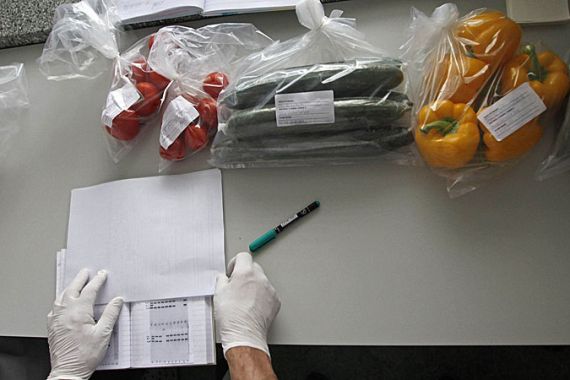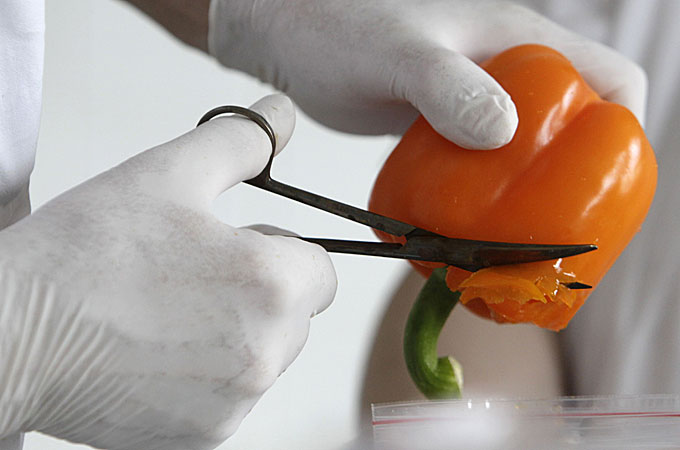WHO warns E.coli outbreak is new toxic strain
Experts studying bacteria that has caused 17 deaths in Europe say it has never been seen in an outbreak before.

 |
| Researchers are testing different vegetables for the toxic bacteria in an effort to determine the source [Reuters] |
The World Health Organisation (WHO) says the E. coli bacteria responsible for the deaths of 17 people across northern Europe is a strain “never seen before” in an outbreak.
Preliminary tests show the bacteria is a mutant form of two different types of E. coli, that have aggressive genes possibly explaining why the outbreak has been so deadly.
Keep reading
list of 4 itemsTurtles swimming to extinction in Malaysia as male hatchlings feel heat
Could shipping containers be the answer to Ghana’s housing crisis?
Thousands protest against over-tourism in Spain’s Canary Islands
“This is a unique strain that has never been isolated from patients before,” Hilde Kruse, a food safety expert at the WHO, told the AP news agency.
Kruse said the strain has “various characteristics that make it more virulent and toxin-producing” than the hundreds of E. coli strains that people naturally carry in their intestines”.
Chinese scientists at the Beijing Genomics Institute [BGI], who have been examining the bacteria, also said it carried genes that made it resistant to some classes of antibiotics.
“This E. coli is a new strain of bacteria that is highly infectious and toxic,” they said.
“The analysis further showed that this deadly bacterium carries several antibiotic resistance genes, including resistance to aminoglycoside, macrolides and beta-lactam antibiotics: all of which makes antibiotic treatment extremely difficult,” said BGI.
Ban on vegetable imports
The origin of the bacteria is still unknown making it impossible to treat effectively. On Thursday Russia’s Consumer Protection Agency abruptly banned all imports on vegetables from European Union [EU] nations.
Only Russian cucumbers and produce are now available in Russia. The agency said it had run out of patience with the WHO.
This move will effect EU agricultural trade significantly. The 27-nation member bloc described the move as “disproportionate”.
Tests on the vegetables come as Russia said it was going to Frederic Vincent, a spokesman for the EU’s Health and Consumer Policy Commissioner, said the European Commission would write to the Russian Agency for the Supervision of Consumer Rights to demand further clarification of the ban.
The United Arab Emirates also issued a temporary ban on cucumbers from Spain, Germany, Denmark and the Netherlands.
The outbreak was initially blamed on Spanish cucumbers by German officials who later admitted that they were in the dark about its origin.
Spain has since demanded a payback for its farmers who have suffered significantly from this accusation.
Infections thus far
The bacteria has sickened more than 1,500 people in northern Europe, including 470 who have developed a rare kidney failure complication.
Seven people in Britain who recently travelled to Germany have been infected with the bacteria, the Health Protection Agency said on Thursday.
Three of those infected were British nationals who had recently travelled to Germany and four were German nationals, the agency said.
Of those cases, three had full-blown haemolytic uraemic syndrome (HUS), a disease that can cause serious liver damage, and the other four suffered bloody diarrhoea, it said.
“All are suspected to be related to this outbreak” in Germany of enterohaemorrhagic E-coli (EHEC), authorities said in a statement.
Although initial reports blamed imported cucumbers for the outbreak researchers have been unable to pinpoint the cause of the illness, which has now hit at least nine European countries.
E. coli is a common bacteria found in meat, vegeatables and fruit. It normally lives in the intestines of people and animals where it helps the body break down food. There are hundredS of E. coli strains but some are harmful.
Problems emerge when the bacteria travels outside of the intestine. Most infections attack the bladder, kidney and blood stream.
To avoid foodborne illnesses, WHO recommends people wash their hands before eating or cooking food, separating raw and cooked meat from other foods, thoroughly cooking food, and washing fruits and vegetables, especially if eaten raw.
Britain’s Health Protection Agency also urged people travelling to Germany to avoid eating raw tomatoes, cucumbers and leafy salad including lettuce.